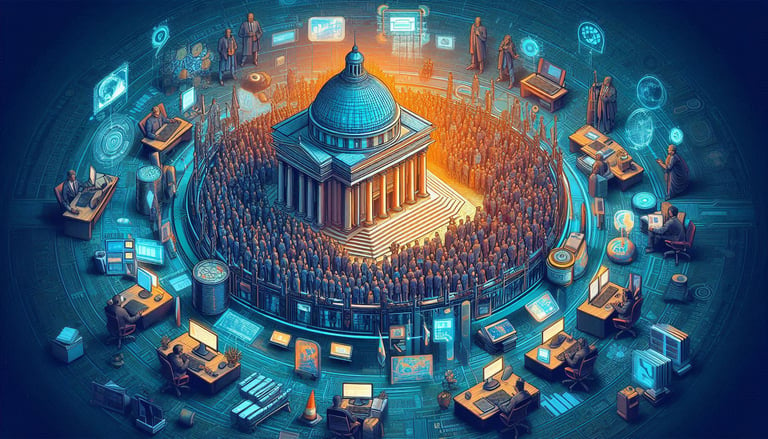Revolutionizing Governance: The Role of Cyber Law in Elevating E-Governance Platforms in Bangladesh
Maria Binte Belal
Chandigarh University
This Blog is written by Maria Binte Belal a Law Graduate of Chandigarh University


Introduction
E-governance has emerged as a revolutionary tool for modernizing government services, boosting transparency, and promoting citizen participation in the contemporary digital era. In Bangladesh, a country that is rapidly adopting digitalization, e-governance has enormous potential since programs like MyGov aim to improve accessibility and speed up administrative processes. However, these advancements also carry with them several new challenges, few among them ensuring security, privacy protection, and fostering public trust in digital platforms. As cyber-attacks get more complex, cyber law plays a bigger role in sustaining these platforms. Because of strong cyber regulations, e-governance operates inside a framework that promotes efficacy, accountability, and trust while also protecting it from security breaches. We address the necessity of robust cyber law frameworks in this blog to protect Bangladesh's digital future and advance e-governance.
Concept of E-Governance in Bangladesh
The term "e-governance" describes how the government interacts with the public, delivers public services, and enhances administrative procedures through digital platforms. A more effective exchange of information is made possible by e-governance, which improves public services, reduces corruption, and fosters transparency. In a developing nation like Bangladesh, where limited access to services and ineffective administrative processes are enduring problems, e-governance has the potential to drastically alter how the government engages with its inhabitants.
Current Landscape
Bangladesh's remarkable progress in e-governance adoption can be attributed in large part to the Digital Bangladesh Vision 2021 national goal, which intends to enhance digital infrastructure and services. Online resources such as MyGov allow citizens to access a range of government services, such as document filing and bill payment. Despite these attempts, issues still exist, such as poor internet connection in rural areas, mistrust of digital platforms, and worries about personal data protection.
The Role of Cyber Law in E-Governance
Establishing a strong legal framework is the first step towards developing a better e-governance platform. A strong legal foundation shows that an e-governance platform is reliable and dynamic. It will support the growing number of citizens using the e-governance platform. When it comes to improving data privacy, bolstering cyber security, and promoting investment and innovation, a strong cyber law can be helpful. Improving data protection fosters citizen and government trust that their information will be shielded from abuse and illegal access. Consequently, a person might feel secure when utilizing e-governance services. The e-governance platform also faces the problem of inadequate cyber security. Ransomware, phishing, and hacking can all pose a legitimate risk to cyber security. The legal foundation for cyber security standards is provided by cyber law. By ensuring legal accountability for violations, it develops a defense mechanism for the e-governance system. By lowering data breaches, intellectual property theft, and cybercrime The government can entice private companies and foreign investors to fund research, software development, digital infrastructure, and emerging technologies for e-governance. The digital economy will grow if investors feel comfortable making investments. Therefore, citizens and businesspeople can feel comfortable in the e-governance ecosystem because of the strong legal framework.
Case Studies
A program like Digital Bangladesh Vision 2021 demonstrates how cyber laws may improve e-governance and improve the delivery of public services. Numerous online channels have made it easier for citizens to access services like tax payments, birth registration, and passport applications. These efforts have made it easier for people in remote areas to obtain government services and have reduced the need for face-to-face interactions.
Challenges
The following are the main obstacles Bangladesh has in realizing the full potential of e-governance:
1. The delivery of services is hampered by bureaucratic red tape and a lack of interdepartmental cooperation, even in the face of digital platforms.
2. People's desire to participate is impacted by their ongoing mistrust regarding the protection of their personal information on government platforms.
3. The likelihood of cyber attacks and data breaches is rising as our reliance on digital services grows, necessitating the creation of robust cyber security protocols.
Conclusion
As a result of Bangladesh's e-governance platform and subsequent digital transformation, cyber legislation is becoming increasingly important in building a safe, reliable, and effective digital infrastructure. Even while initiatives like MyGov have improved transparency and the provision of public services, the growing threat of cyber-attacks and data breaches still calls for a strong legal framework. Bangladesh can adopt and enforce strong cyber laws to protect sensitive information, uphold accountability, and boost public trust in its digital infrastructure. In the end, a properly controlled cyberspace will safeguard the nation's digital infrastructure and allow e-governance to realize its full potential, revolutionizing the political system and giving the people more power.
References:
1. Government of Bangladesh, Digital Bangladesh Vision 2021 https://a2i.gov.bd/vision-2021/ accessed 10 October 2024.
2. MyGov Bangladesh – Official Website https://mygov.bd/ accessed 10 October 2024.
3. Ministry of Posts, Telecommunications, and Information Technology, Digital Security Act 2018 https://www.mopt.gov.bd/ accessed 11 October 2024.
4. Government of Bangladesh, Information and Communication Technology (ICT) Act 2006 https://www.ictd.gov.bd/ accessed 11 October 2024.
5. Ministry of Electronics and Information Technology (MeitY), Digital India https://www.digitalindia.gov.in/ accessed 12 October 2024.
